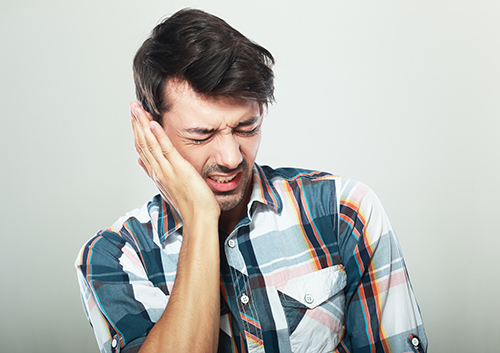What to Know if You Think You Have a Cracked Tooth
July 10th, 2024

You use your mouthguard for sports, wear a nightguard if you grind your teeth, and never bite down on solid objects. But even with all the care in the world, accidents happen. If we break a leg, our bones can regenerate tissue and knit together over time. A cracked tooth, on the other hand, can only be repaired, but will not heal. The right treatment is essential to protect your injured tooth. If you suspect you have a fractured tooth, what should you do?
Sometimes you know right away when you’ve cracked a tooth. A fall off a bike, a blow to the face on the basketball court, a bite of something that turned out to be much harder than it should have been—the results can be instantly apparent. If you have a broken or chipped tooth, call our Anthem office immediately. If you have lost a piece of your tooth, bring it in with you. Early treatment can not only restore the appearance of your tooth, but might prevent the possibility of infection or damage to the root and pulp.
Sometimes, a fractured tooth is an unwelcome surprise. It doesn’t take one specific incident to cause damage to a tooth. A crack or break can develop over time if you grind your teeth, have a large filling that has compromised a tooth, or have undergone a root canal procedure that has left the tooth brittle. You might notice a crack or a missing piece of tooth, or experience pain while chewing or sensitivity to heat and cold. If you have any of these symptoms, call us. Once again, the earlier a tooth is treated, the better the outcome.
No matter how you discover an injury, immediate treatment by Drs. Peter Vogel, Vijal Vadecha is the best way to safeguard your healthy smile. Prompt treatment and restoration repair your smile cosmetically, and, in the case of more serious fractures, extend your tooth’s life, prevent further damage, and ward off potential infections of the gum and bone.
We have many options for restoring your damaged tooth, and our recommendations will depend on the type of injury your tooth has suffered.
- Chips
It is important to bring any broken piece of your tooth with you because sometimes the piece can be reattached. If that is not possible, a small chip might only require bonding with a tooth-colored resin. A veneer is an option for a larger chip, or where a translucent, natural appearance is important. If the chip is deep enough, and there is pulp damage, we might suggest a root canal and a crown.
- Broken Cusps
A lost cusp is a common result of injury, especially near a filling. If the pulp is unaffected, which is generally the case, a filling or crown can restore the appearance and function of the tooth.
- Cracks through the Tooth
A tooth cracked from the chewing surface to the root presents a more serious problem. If the crack has extended to the pulp, but remains above the gum line, a root canal and crown can preserve the tooth. If the crack extends below the gum line, however, extraction might be necessary. Early cracks will eventually extend below the gum line, so early treatment is essential.
A tooth can also fracture from the root up. Any crack in the root is a serious matter, and often is not discovered until infection has set in. Extraction is a common recommendation, although some specific cracks near the tip of the root might be treated with endodontic surgery.
- Split Tooth
Sometimes an untreated vertical crack can lead to a tooth split into two pieces. An endodontist can determine whether any portion of the tooth can be saved, although extraction is more likely.
If you injure your tooth, or have any symptoms of a tooth fracture, call us immediately. Whether you have suffered a chipped tooth, a broken cusp, crown or root fractures, or even a split tooth, prompt treatment is the best way to restore and protect your attractive and healthy smile.
Teens and Gum Disease
July 4th, 2024

You have a lot going on. School. Sports. Activities. Family. Friends. Teens lead busy lives and have busy schedules, so you need to budget your time and energy. One thing you don’t want to spend any of your time and energy on? Dealing with gum disease.
Gum disease most often begins as a reaction to plaque and tartar. The bacteria in plaque produce acids which irritate gum tissue, causing inflammation, swelling, and bleeding. This is gingivitis, the early stage of gum disease.
Left untreated, early gum disease can become periodontitis. Periodontitis is a serious gum infection which can cause receding gums, loose teeth, and even tooth and bone loss.
We usually think about gum disease as something that only older adults worry about. But the unfortunate fact is that children and teens are also at risk for gum disease—and the teen years bring special risks. Why?
- Braces
The teen years are the most common years for orthodontic treatment. Wearing traditional or lingual braces can make removing plaque from around brackets and wires, between the teeth, and near the gum line more challenging, and gum disease can be the result. When you’ve been working so hard to create a healthy attractive smile, you don’t want to delay your orthodontic progress to treat gum disease.
- Less-than-Nutritious Snacking
When you have after school commitments like sports practices, play rehearsals, or work, you probably carry a snack to give you the energy you need until dinner. Popular snacks like energy drinks, chips, or candy bars are common go-to choices, but they contain acids, simple carbs, and sugars which are bad for both gums and tooth enamel.
- Hormones
Increased hormone levels during puberty can make the gums more sensitive and more easily irritated.
- Your Busy Life
Maybe you’re not getting enough sleep. Or eating as well as you could. Or you’re feeling anxious. Lack of sleep, poor nutrition, and stress can affect your body’s immune system and your ability to fight off infection. And if you’re also not brushing and flossing regularly, your gum health can really suffer.
How do you know if you have gum disease? Good question! Sometimes the early stages of gum disease aren’t obvious. Perhaps you’ve noticed changes in your gums, such as:
- Redness
- Swelling
- Soreness
- Bleeding
- Bad breath even after brushing
Any of these changes can be symptoms of gum disease and are a good reason to give our Anthem office a call, since time is important when treating gum disease.
Caught early, gingivitis is usually very treatable—in fact, you can often reverse early gingivitis by paying more attention to your daily dental hygiene. If gingivitis is more advanced, or if periodontitis develops, you need professional dental care to prevent serious damage to your gums, teeth, and bone.
Preventing gum disease from ever developing is always best, though, so let’s look at what you can do to keep gum disease from becoming a problem.
- Keep Up with Healthy Dental Habits
Even though you’re leading a busy life, take time for your dental care. Brushing twice a day for at least two minutes per session and flossing once a day take just a bit of your time and are the best way to keep your gums healthy. If you wear braces or have a tendency toward cavities and gum disease, Drs. Peter Vogel, Vijal Vadecha might recommend brushing or flossing more often.
- Use the Right Tools
Using the right tools makes a big difference. You should always choose a toothbrush with soft bristles to protect your delicate gum tissue—especially if it’s extra sensitive. Too-harsh brushing can damage even your super-hard tooth enamel, so you can imagine what it can do to your gums! Change out your brush every three to four months when it starts to get frayed and worn.
If you wear braces, ask Drs. Peter Vogel, Vijal Vadecha to recommend the best kind of floss to clean between your teeth and around your brackets and wires. The right tools will make flossing a lot easier, and will help you keep your gums healthy and your orthodontic treatment on track.
- No Matter How Busy You Are, Treat Yourself Well
Watch your diet. Drinking water to hydrate is a healthy (and inexpensive) alternative to sugary and acidic drinks. When you know you have after-school commitments, pack yourself a healthy snack. After snacking, it’s a good idea to rinse with water when you can’t brush to remove any food particles sticking around your teeth and gums.
And even though your schedule is demanding, caring for your mind and body should be a priority. If you have difficulties with sleep or stress, or questions about a nutritious diet, talk to your doctor for some valuable tips to make your daily life healthier and more enjoyable.
With so much going on in your active life, gum problems are problems you really don’t need. Make room in your schedule now for careful daily brushing and flossing, a healthy lifestyle, and regular visits to Daisy Mountain Dentistry, and you’ll be living that active life with a beautiful, healthy smile!
Need Another Reason to Stop Biting Your Nails?
June 27th, 2024

Painful nails and cuticles, ruined manicures, reluctance to shake hands—there are so many good reasons to overcome the nail biting habit. But did you know that biting your nails is also bad for your dental health? Let’s look at a few more reasons to give our nails a break.
- Bacteria Bonanza
It’s a vicious—and unhealthy—circle. Nail biting leads to injuries to the nails, cuticles, and skin surrounding the nails. These broken, jagged nails can now cause injury to delicate gum tissue. And to make things worse, fingernails harbor a lot of germs and bacteria, leading to the risk of illness and oral infections. At the same time, bacteria from our mouths can get into the area around the injured nail, potentially leading to painful infections in the fingers.
- Bruxism
Studies have indicated that nail biters have a greater risk of bruxism. Bruxism, better known as tooth grinding, can lead to a number of serious problems over time. Grinding and even clenching teeth on a regular basis can cause chronic headaches, worn enamel, fractured teeth, broken dental restorations, receding and inflamed gums, and loose teeth.
- Breakage & Bad Bites
Your nails suffer obvious breakage, clearly, but your teeth are also at risk. The constant pressure of nail biting can lead to cracking, chipping, and erosion in the front teeth. Further, the pressure put on your teeth can even move them out of alignment, leading to bite problems. As you can imagine, nail biting has an even greater impact if you are wearing braces, because those teeth are already under pressure.
Why do we bite? Nail biting, or onychophagia, is a habit often started in childhood. Some people quit on their own as they reach adulthood, but for others, it can be a lifelong and painful habit. The explanations for nail biting are many: some researchers regard the habit as a form of compulsive behavior, others believe it to be a grooming impulse gone haywire, still others think it’s a way that we respond to anxiety or other stresses.
Whatever the cause, if you want to break the habit, you have options. There are over the counter polishes that use an unpleasant taste to deter biting. Learning to recognize triggers such as stress or boredom can help you choose a different response, such as snapping a rubber band around your wrist or gripping a stress ball. Drs. Peter Vogel, Vijal Vadecha can recommend some techniques for modifying this behavior. And finally, we can offer you suggestions for quitting, or even customize a mouthguard at our Anthem office to discourage nail biting and prevent the problems that come with bruxism.
It’s never too late to quit. If nail biting has become more than a cosmetic problem, let’s work on a solution. Healthy, attractive nails are a great goal to work toward, but nothing beats a beautiful, healthy smile!
Make Tooth Brushing Fun
June 20th, 2024

The best brushing routine for parent and child is two minutes of gentle brushing in the morning and two in the evening. But if the longest four minutes of your day are spent helping your child brush and floss, here are some suggestions for making that time fly.
Options!
Children’s brushes come in a wonderful variety of colors, patterns, and shapes. Allow your child to choose a favorite the next time you go shopping for dental supplies. Just make sure to choose a soft bristle brush with a head designed for small mouths. And since toothbrushes generally wear out after three months, your child will have plenty of opportunities to pick and choose! You might also explore the many flavors of children’s toothpaste to find the one that your child finds most appealing, and let your young brusher squeeze out a dab on that new brush.
Reward Daily Brushing
You don’t have to go to great lengths to make your son or daughter feel rewarded for a job well done. Allowing children to pick out a story for you to read or posting colorful stickers on a calendar sheet will encourage them to get into the habit of brushing.
Two-Minute Countdown
Time seems to go faster when we’re having fun. Your child might enjoy listening to songs or stories for the two minutes of brushing time. You can make your own playlist, invent a story starring your child, or make use of one of the dental apps that offer children’s music, videos, and stories in perfect two-minute segments.
Do It Together
Spend these two minutes twice a day with your child. You will be doing all the brushing at first, of course, but as your children get older, brush your teeth along with them. You can model proper brushing techniques for cleaning teeth, gums and tongue, and even let your child have a chance to brush your teeth for a change.
Don’t Forget Checkups!
Scheduling checkups and professional cleanings at our Anthem office is vital to maintaining your child’s oral health. And, if your son or daughter is keeping up with good hygiene at home, these visits should be a breeze!
The habits your child develops now will be the foundation for a lifetime of oral health. Make these four minutes a day count. And if you can create ways to make them fun, those four minutes will fly by for both of you!


